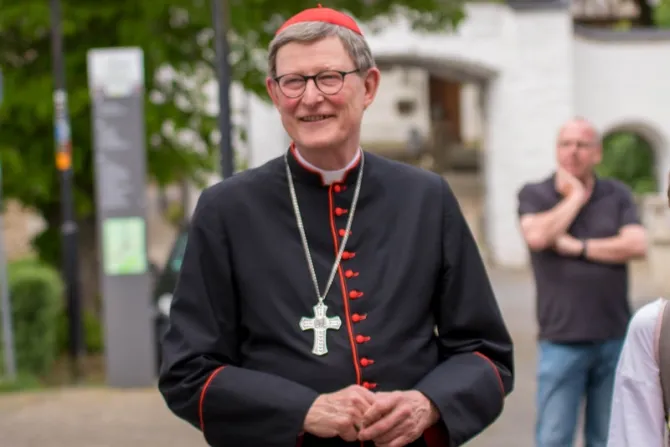The German Bishops’ Conference has convened once again, and the world watches as this pivotal assembly grapples with the profound challenges facing the Catholic Church in Germany. Amidst the discussions on handling sexual abuse by clergymen and preparations for the Synod on Synodality in Rome, it is the divisive issue of blessing same-sex unions that has drawn significant attention and debate.
At the heart of this debate is Cardinal Rainer Maria Woelki, Archbishop of Cologne, who finds himself under mounting pressure from various quarters, including local media and some clergy. Just recently, several priests openly defied the Vatican’s stance by blessing same-sex couples outside the Cologne Cathedral, accompanied by the iconic Beatles’ anthem “All You Need Is Love” and rainbow flags. Such acts of defiance are a testament to the changing attitudes within the Church and reflect a growing desire for inclusivity and acceptance.
Cardinal Woelki’s reprimand of a priest for blessing same-sex unions has not gone without criticism. Birgit Mock, vice president of the Central Committee of German Catholics, has labeled Woelki’s actions “beyond incomprehensible.” Mock, who also heads the Synodal Way’s working group on sexuality, stands as a staunch advocate for blessing same-sex unions, setting her at odds with Woelki and the official Vatican stance.
Tensions intensify
The tensions within the German Church have only intensified with Bishop Georg Bätzing of Limburg’s recent criticism of Woelki, suggesting that he has “lost acceptance” among the people. These public disagreements within the Church highlight the urgency of addressing these issues openly and honestly.
It is essential to recognize that the German Church’s pursuit of a more liberal and inclusive stance is not a sign of disrespect to the Vatican but rather a reflection of the evolving beliefs and values of the global Catholic community. The Church in Germany is not alone in its quest for greater acceptance and understanding of LGBTQ+ individuals and their unions.
The challenges facing the German Church extend beyond same-sex unions. Issues like gender identity have also been on the agenda, showcasing a willingness to reevaluate traditional perspectives and embrace a more progressive approach.
While the Vatican’s Congregation for the Doctrine of the Faith has issued a formal declaration against blessing same-sex unions, the continued open defiance by prominent prelates like Cardinal Reinhard Marx demonstrates the complexity of harmonizing the German Synodal Way with the Synod on Synodality.
Far- reaching Implications
The stakes are high as the German bishops convene in Wiesbaden. Cardinal Woelki, often portrayed as a polarizing figure in the midst of these tensions, faces a critical juncture. The decisions made this week will undoubtedly have far-reaching implications, not just for the German Church but also for the global Catholic community as it prepares for its synodal gathering in Rome.
Perhaps the most pressing issue is the mass exodus of Catholics in Germany, with more than half a million baptized Catholics leaving the Church in 2022 alone. This alarming trend underscores the urgent need for the Church to regain trust and credibility. The meeting in Wiesbaden represents a crossroads in determining whether the Church can find a path forward that resonates with its faithful and prevents the specter of schism from becoming a reality.
In these challenging times, it is crucial to recognize the importance of a liberal and inclusive Catholic Church that is willing to engage with evolving societal norms and values. The German Bishops’ Conference has an opportunity to lead the way in fostering a more compassionate and accepting Church, one that can bridge the gap between tradition and modernity. By embracing inclusivity and understanding, the Church can begin to rebuild trust, not just within Germany but across the global Catholic community. This is a moment of great significance, and it is our hope that the German bishops choose the path of unity, compassion, and progress.


